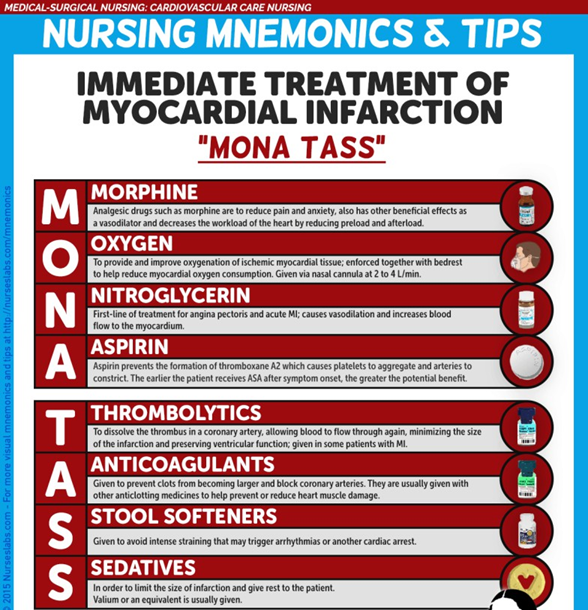A nurse is reviewing the client's diagnostic results and vital signs.
Which of the following actions should the nurse take? Select all that apply.
Anticipate client to be prepped for cardiac catheterization.
Assist with a continuous heparin infusion.
Encourage the client to ambulate.
Anticipate an increased dosage of metoprolol.
Obtain a prescription for client to be NPO.
Request a prescription for an antibiotic.
Correct Answer : A,B,D,E
Chest pain radiating to the left arm is characteristic for angina in coronary artery disease. This is suggested more by the client’s medical history of hypertension, hyperlipidemia and type 2 diabetes mellitus.
Clients with angina are scheduled for diagnostic cardiac catheterization to assess the extent of coronary blockage
Heparin is used to prevent the propagation of a clot that is formed on an unstable atherosclerotic plaque. Beta blockers are prescribed to lower the heart rate. This reduces the myocardial demand for oxygen.
The firstline medication include antiplatelets unless there's concurrent venous thromboembolism.
Keeping the client NPO within 2 hours of the procedure is important to prevent aspiration whole under sedation.
Ambulation increases demand on the heart which may worsen the pain Antibiotics have no role in coronary artery disease.

Nursing Test Bank
Naxlex Comprehensive Predictor Exams
Related Questions
Correct Answer is C
Explanation
A. The head of the bed should be elevated to 30 degrees to reduce intracranial pressure.
B. Bacterial meningitis is transmitted through hematogenous route and airborne precautions are not always necessary.
C. Clients with meningitis may be sensitive to light, dimming the lights should be implemented to increase comfort by reducing stimuli.
D. Encourage frequent ambulation is not appropriate for bacterial
Correct Answer is ["C","D","E","F"]
Explanation
The client is likely suffering from diabetes ketoacidosis with metabolic acidosis not respiratory alkalosis. They are also severely dehydrated which may lead to hypotension and acute renal injury. In DKA, clients may have hyperkalemia or hypokalemia who h may predispose to cardiac dysrhythmias.
Septic shock is unlikely as the chest exam indicates likely resolved pneumonia.
Cerebral edema is commonly seen in clients on hydration therapy in DKA due to rapid fluid replacement.
Whether you are a student looking to ace your exams or a practicing nurse seeking to enhance your expertise , our nursing education contents will empower you with the confidence and competence to make a difference in the lives of patients and become a respected leader in the healthcare field.
Visit Naxlex, invest in your future and unlock endless possibilities with our unparalleled nursing education contents today
Report Wrong Answer on the Current Question
Do you disagree with the answer? If yes, what is your expected answer? Explain.
Kindly be descriptive with the issue you are facing.
